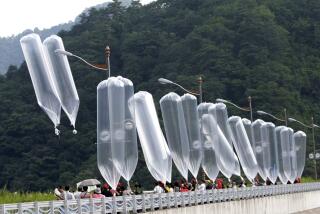In the Koreas, Hope but Still No Cheering
- Share via
It is still too soon to be sure whether North and South Korea are engaged in an escalating tactical game for international political advantage--which seems most likely--or whether a genuinely new opportunity for easing tension on the peninsula and for relations between the two Koreas may be on the horizon.
The North is frustrated by the steady growth in economic strength, political confidence and military power of the South. Its friends are distancing themselves from its policies, taking part in the Olympic Games and seeking new economic openings to Seoul. The only cards in its hand are the South Korean desire for reunification, anti-Americanism in the South over trade and political issues, and the threat of war and violence.
Pyongyang has attempted to use all three in the last eight months--conspiring in the destruction of a Korean Air Line plane last November and encouraging both anti-American demonstrations by students and meetings between North and South Korean students at the demilitarized zone.
In June and July, Seoul opened a barrage of proposals of its own--student and intellectual exchanges, soccer matches, trade exchanges and family reunion meetings--many revived from the past but with some striking new elements. Most important was South Korean President Roh Tae Woo’s July 7 announcement that henceforth Seoul would not treat Pyongyang as an enemy and would help it gain trade and diplomatic relations with Japan, the United States and other Western countries, halt anti-North Korean propaganda, encourage participation and interchange in international organizations, and work toward reintegration of North and South into a single political community.
Pyongyang reflexively dismissed Roh’s remarks but in reality seemed stunned by the breadth of the proposal and its support by most opposition party leaders in the South. It immediately groped to recover the initiative. Having for months refused all official messages from the South, it acknowledged a letter from the speaker of the South Korean Assembly urging North Korean participation in the Olympics. Pyongyang’s response was a strikingly non-polemical proposal. It ignored the Olympics (although it later indicated that this could still be discussed) and revived the idea of a meeting of the parliaments of the two Koreas in Pyongyang this month. The key agenda item would be a non-aggression agreement.
The South--with all political parties in agreement--responded with a guarded and uneasy “yes,” but understandably insisted that no meeting that large and complex could be organized in a few weeks without preparatory discussions of the agenda, the format and technical modalities. Pyongyang wants a public-relations circus without preliminaries but still might agree to some compromise. At least the ball is still in play.
Seoul’s immediate objectives are clear: to ease tensions before the Olympics and fears of violence and disturbances during the games. Any dialogue with the North in the next two months could contribute to this. There are also strong and widespread domestic pressures for creative efforts toward reunification. For Roh, his new policy is a major effort to build domestic political support, particularly given his Justice Party’s minority position in the National Assembly. Finally the South hopes to give Moscow and Beijing--both actively seeking to broaden their ties with South Korea but still somewhat constrained by their ties to Pyongyang--political ammunition with which to urge moderation on their friends in the North.
The Soviets and Chinese have warned Pyongyang not to count on their support if it starts a war or initiates terrorism during the Olympics. Both hope to open unofficial trade offices in Seoul soon, and China’s commerce with the South already far exceeds its commerce with North Korea.
Some observers have in the last year sensed a desperate desire on the part of some officials in the North to open their society politically and economically. It is hard to see how Kim Il Sung and his son and heir-apparent, Kim Jong Il, can retain their iron control of policy and politics and yet open the door to outside contacts. Nor until recently have public or private statements out of Pyongyang offered any encouragement. The odds thus still favor the North as playing only for tactical advantage, not for serious negotiations.
The United States is right to support the South’s initiatives, and indeed has little alternative. Washington is ready to renew efforts at a political and economic dialogue with the North itself after the Olympics, earlier initiatives last year having been dashed after the KAL incident. A call for U.S. congressional-North Korean parliamentary meetings communicated by Pyongyang to the United States in late July is consistent with Seoul’s own policy and can be welcomed in principle.
Regional tensions are easing around the world--Afghanistan, the Persian Gulf, Angola, Cambodia--and the political and economic gains from this trend may even reach North Korea, with encouragement from Moscow and Beijing. There are many ways Pyongyang could show that it is serious. A peaceful Olympics is certainly one and the beginning of serious North-South talks and action on interexchanges and confidence building is another. But neither Washington nor Seoul can forget that the Korean War began in 1950 while talks were under way between North and South Korea. It is much too early for cheering, but not for very modest hopes.
More to Read
Go beyond the scoreboard
Get the latest on L.A.'s teams in the daily Sports Report newsletter.
You may occasionally receive promotional content from the Los Angeles Times.






